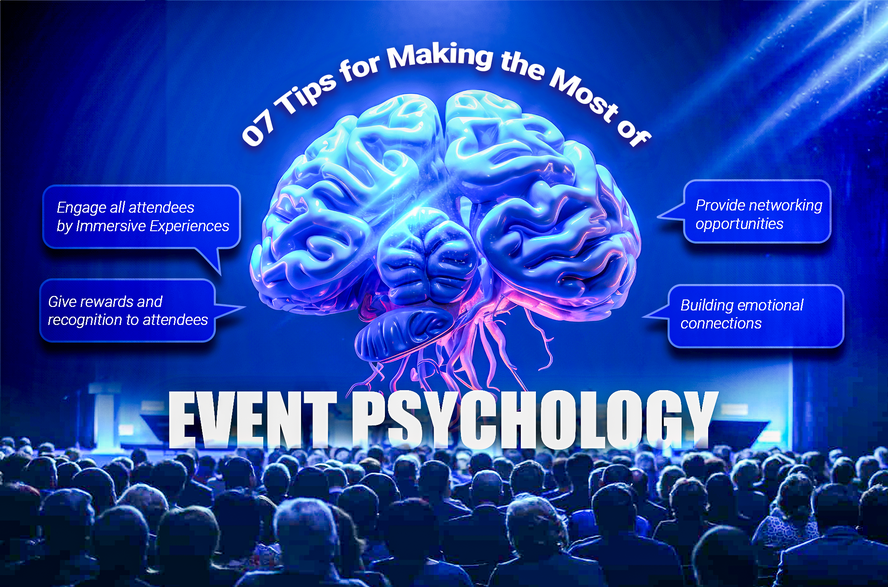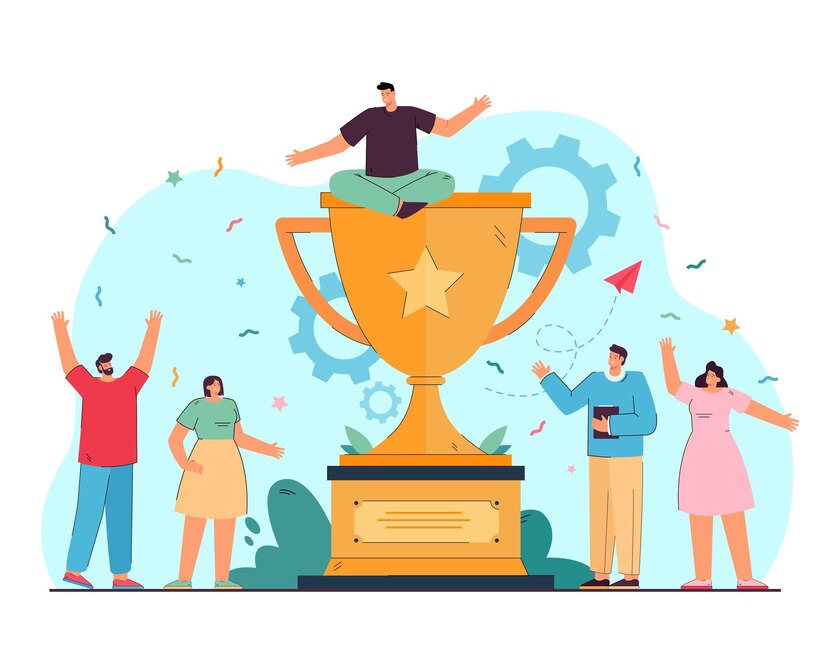
Thriving in any industry requires a good understanding of human behavior. In this case, it would translate into consumer behavior. What makes event attendees tick? What drives them to register for an event? How can they elevate their sensorial experience at an event? These questions have answers in the field of event psychology.
Although a relatively new field of expertise, event psychology borrows from neuroscience, sociology, and psychology. To create memorable event experiences, event professionals must dive deep into their attendees’ psyches and take advantage of insights from event psychology.
To help you get started, we have listed a few tips backed by event psychology to elevate your overall event experience.
Here are 7 Tips for Making the Most of Event Psychology:
Here are seven tips for making the most of event psychology:
1. Plan Sessions with Adequate Breaks
Regardless of your desire to give maximum information to your audience, attendees will only grasp a fourth of the content. This is not their fault or yours; it’s just science. With the average attention span ranging from 2 seconds to 20 minutes, it can be quite a challenge for attendees to sit through 1.5-hour-long sessions.

According to world-renowned Event Psychologist Victoria Matey, event planners should design shorter sessions and plan breaks between sessions for enhanced audience engagement. This holds for both online and offline events. On an event-based podcast, Victoria went on to say:
“Without a break, people are doomed to get more stressed and lose focus. Taking breaks improves engagement and concentration significantly”.
She even refers to a study by Microsoft that shows the steady decline in the attention span of people who attended back-to-back online meetings. So, for a better event experience, plan for frequent breaks in your event schedule.
2. Use Event Psychology in Design Flow for the Best Event Experience
According to research published in the National Library of Medicine, colors have a significant impact on our minds. The same applies to lighting and sound. Strategic use of colors, sound, and lighting can enhance or worsen the whole event experience for your attendees. For example, the study states that blue light is known to increase alertness in people, while the color red tends to increase a sense of caution or aggression.
According to an article published in the London Image Institute, the color orange is ideal for business settings as it encourages sociability, optimism, and self-confidence. Orange can also be used for networking and breakout zones at the event venue. Green promotes healing and well-being, and green elements like plants and faux grass can help increase overall attendee satisfaction.
In terms of lights, warm lighting encourages people to network and connect with others. And bright lights tend to be more stimulating, encouraging people to be more attentive.
3. Give Rewards and Recognition to Attendees
Abraham Maslow’s theory on the hierarchy of needs states that esteem needs are one of the core requirements for human existence. They refer to man’s need for status, recognition, and achievement. Tapping into this need, event organizers should do whatever it takes to make their attendees feel honored for their accomplishments. This can be done by introducing games in between sessions, having leaderboards to see the overall performance of participants, and then giving out awards for the top performers.

Another way to fulfill their esteem needs is through personalization. This can be done by sending personalized event invites, offering them personalized suggestions on the workshops and sessions best suited to them, and giving them personalized gifts with their name, company logo, and other details on them.
4. Ensure People Benefit from the Event.
Humans have a strong drive for self-growth and continuous improvement. According to an article published by Researchgate, “The concept of self-growth for personal development and growth, whether achieved as formal or informal processes at an individual level or throughout an institution’s culture, forms the basic foundation of one’s way of being.”
This can also be circled back to the self-actualization needs mentioned in Maslow’s hierarchy of needs.
Event planners and marketers must remember that they have to understand their audience profile and cater to their specific needs for growth. Most professionals who attend business events intend to update their knowledge of their field and network with professionals in their field. So, make sure the event structure is planned in a way to fulfil the core need for personal growth for all attendees. Get competent professionals in the field to organize useful workshops and keynote speakers who can provide genuine value addition to their listeners.
5. Provide Networking Opportunities
The success or failure of an event depends on many factors, and the opportunity to network is one of them. As per a study published by the MediaMarketSheet on the emerging trends in the event industry, the need for human-to-human connection continues to exist irrespective of the event format (in-person/virtual). When Aristotle said
“Man is a social animal, an individual who is unsocial naturally and not accidentally is either beneath our notice or more than human. Society is something that precedes the individual.”
it wasn’t just from a sociological standpoint. In fact, there is a full-fledged science known as social psychology that studies the behavior of man in society.

So, event marketers must structure their events to encourage maximum interaction and networking among attendees for enhanced audience satisfaction. To understand how to get your audience to network, read 29 Dynamic Networking Event Ideas to Make a Lasting Impression.
6. Leverage an Event Review Platform to Connect with Potential Attendees.
In an age when people read reviews to make all kinds of decisions, it makes sense to get your event listed on a review platform. This way, your target audience will have all the necessary information about your event from the previous year to make an informed decision about attending your event.
Victoria Matey, the event psychologist, speaks about the importance of social proof when she says,
“And I can say that this is the most researched behavioral bias, which shows that we look to others to validate our behavior, especially if we are in a situation of uncertainty, which is again, very valid these days. Social proof is a super powerful concept.”

Event planners can use this concept to their advantage and get their events listed on review platforms, where their potential audience can enrol. Eventible is the world’s first online review platform for global events where attendees, sponsors and speakers review the events they’ve been to. This information further helps attendees to decide on which event to register for.
7. Conduct Post-event Analysis Through Attendee Feedback.
The notion that ‘we matter’ is significant to one’s self-esteem and self-worth. Everyone, at some level, wants to feel significant and that they matter. In fact, the lack of significance has been attributed to many psychological illnesses.
According to a study conducted by Harward scientist Ellen Langer, people who tend to feel significant with a deep sense of responsibility tend to live longer. He gave plants to two groups of people in a nursing home and told the first group that it was their responsibility to take care of the plant and the second group that the staff would take care of the plant. After a year and a half, twice as many patients in the first group were alive.
Event organizers need to bank on this need for significance in their audience while doing a post-event analysis. Firstly, instead of naming the feedback a ‘survey,’ it can be helpful to call it ‘advice’ while connecting with people for input. This way, they feel they are on the same page as the event organizer. And the fact that their feedback can make a difference will ignite their need for significance and make them feel special.
Secondly, make sure to collect feedback from attendees within 48 hours after the event. The longer you wait, the higher the chances of improper feedback, as people tend to forget event details after a while. So, you might as well bank on their input while everything is fresh in their minds.
Key Takeaway
These were a few psychology-backed tips to make your next event a hit. While most event management professionals fret about executing their plans to perfection, it can be immensely helpful to revisit core event strategies based on how people’s minds work and what drives them to certain behaviors.
Using event psychology to create strategies for your events can be a good starting point for event planning. The inside-out approach has helped marketers and businesses thrive for decades. Using the same approach in the world of event planning can make a mountain of difference in providing enhanced audience engagement and maximum audience satisfaction and retention.




Comments are closed.